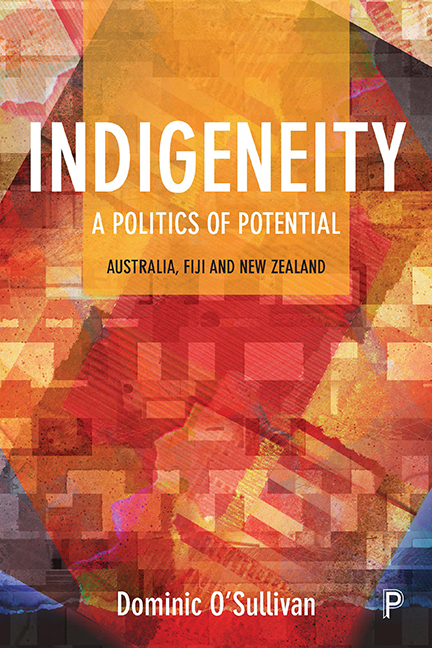Book contents
- Frontmatter
- Dedication
- Contents
- Acknowledgements
- Introduction
- one Reconciliation
- two The politics of indigeneity
- three Liberal democracy and differentiated citizenship
- four Liberal democratic inclusion
- five Indigeneity and contemporary globalisation
- six Economic development as differentiated citizenship: Australia
- seven Economic development as differentiated citizenship: New Zealand
- eight Economic development as differentiated citizenship: Fiji
- Conclusion
- References
- Index
three - Liberal democracy and differentiated citizenship
Published online by Cambridge University Press: 05 April 2022
- Frontmatter
- Dedication
- Contents
- Acknowledgements
- Introduction
- one Reconciliation
- two The politics of indigeneity
- three Liberal democracy and differentiated citizenship
- four Liberal democratic inclusion
- five Indigeneity and contemporary globalisation
- six Economic development as differentiated citizenship: Australia
- seven Economic development as differentiated citizenship: New Zealand
- eight Economic development as differentiated citizenship: Fiji
- Conclusion
- References
- Index
Summary
Introduction
Citizenship defines the terms of belonging to the modern state. It is an ideological and power laden concept which can exacerbate, exaggerate or mediate tensions over the distribution of power and authority. Reductionist conceptions of citizenship mean that it does not always affirm indigenous human dignity, equality or personal sovereignty (Alfred, 2009; Moreton-Robinson, 2004; Moreton-Robinson, 2005). Nor does it routinely contribute to the maintenance of a political order in which government is truly by the consent of the people, and in which indigenous peoples participate actively and on their own terms. The state is rarely seen as ‘theirs’ and citizenship is not perceived as a universal construct, capable of definition and expression in one absolute and just form. Its positioning of people vis-à-vis the state provides insight into wider dynamics of power and authority, and helps to explain why Aristotle's proposition that the citizen is ‘he who has power to take part in the deliberative or judicial administration of any state’ (Hindess, 2000, p. 94) does not always reflect contemporary indigenous political experience. It may also explain the view of Sitiveni Rabuka, who led the military removal of two Fijian governments in 1987, that democracy is a ‘foreign flower unsuited to Fijian soil’ (Lal, 2002, p. 148) and the position that one cannot justify recourse to liberal ideas, when democratic citizenship is not an indigenous Fijian concept, and when Fijians had little say in the mass Indian migration which dramatically re-shaped the local political order? Even the British Cabinet had accepted, at the time of independence, that Fijian dominance was just, provided that there were ‘adequate safeguards for all other communities’ (Emery in Norton, 2004, p. 163).
An alternative position to Rabuka's is that there is, in fact, considerable potential for a liberal theory of indigeneity, proceeding from differentiated citizenship, to develop the right to difference in cultural expression, but sameness in political opportunities; difference in forms of land tenure, but sameness in capacity to make decisions about how land will be used; difference in the way one is taught at school, but sameness in terms of educational quality.
- Type
- Chapter
- Information
- Indigeneity: A Politics of PotentialAustralia, Fiji and New Zealand, pp. 51 - 70Publisher: Bristol University PressPrint publication year: 2017

